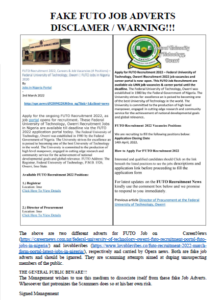The department of Cybersecurity being a neophyte in the university was created because of the need for protecting the cyberspace at all times. The cyberspace has become a critical infrastructure for most countries because of the internet and cloud computing applications vital to most human activities such as banking, commerce, government, education, medicine, transportation, military and politics.
The cyberspace has risks and vulnerabilities and the pool of available qualified professionals to diagnose and prevent security intrusions is inadequate to meet the growing needs of Nigeria. Consequently, it has become important to build capacity in Cybersecurity for the protection of organizations and individuals as they use the cyberspace for business and entertainment.
The knowledge areas of Cybersecurity are obtained from its neighbouring departments of Computer Science, Software Engineering, Information Technology and Electronic and Computer Engineering. Knowledge from Data Science, Forensic Science, Law and Criminology is also required. The possible areas of specialization are Cybersecurity Analysis, Information System Security, Ethical Hacking, Network Security, Digital Forensics and Auditing.
At the end of the programme, we are producing Cybersecurity experts capable of protecting digital assets, as well as guarding critical infrastructure, business and industrial ecosystems in Nigeria.

